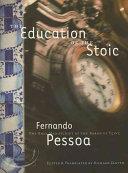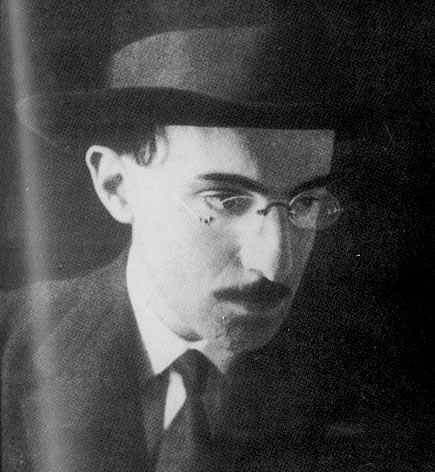Works
The Book of Disquiet
Fernando PessoaMensagem
Fernando Pessoa
The Education Of the Stoic
Fernando PessoaFamous Fernando Pessoa Quotes
Os sentimentos que mais doem, as emoções que mais pungem, são os que são absurdos – a ânsia de coisas impossíveis, precisamente porque são impossíveis, a saudade do que nunca houve, o desejo do que poderia ter sido, a mágoa de não ser outro, a insatisfação da existência do mundo. Todos estes meios tons da consciencia da alma criam em nós uma paisagem dolorida, um eterno sol-pôr do que somos.
The Book of Disquietude, trans. Richard Zenith, text 196
Source: The Book of Disquiet
Repudiei sempre que me compreendessem. Ser compreendido é prostituir-se. Prefiro ser tomado a sério como o que não sou, ignorado humanamente, com decência e naturalidade.
Source: The Book of Disquietude, trans. Richard Zenith, text 128
Fernando Pessoa Quotes about life
“Literature is the most agreeable way of ignoring life.”
A literatura é a maneira mais agradável de ignorar a vida.
Variant: To write is to forget. Literature is the pleasantest way of ignoring life.
Source: The Book of Disquietude, trans. Richard Zenith, text 116
Para ser grande, sê inteiro: nada
Teu exagera ou exclui.
Sê todo em cada coisa. Põe quanto és
No mínimo que fazes.
Assim em cada lago a lua toda
Brilha, porque alta vive.
Ricardo Reis (heteronym), Ode (14 February 1933), in A Little Larger Than the Entire Universe, trans. Richard Zenith (Penguin, 2006)
Source: Poems of Fernando Pessoa
“There are ships sailing to many ports, but not a single one goes where life is not painful.”
Source: The Book of Disquiet
Ibid., number 168
The Book of Disquiet
Fernando Pessoa Quotes about feelings
“I don't know what I feel or what I want to feel. I don't know what to think or what I am.”
Source: The Book of Disquiet
“And, like the great damned souls, I shall always feel that thinking is worth more than living.”
Source: The Book of Disquiet
Fernando Pessoa: Trending quotes
“No intelligent idea can gain general acceptance unless some stupidity is mixed in with it.”
Não há nenhuma ideia inteligente que possa ganhar aceitação geral sem ser misturada antes com um pouco de estupidez.
The Book of Disquietude, trans. Richard Zenith, text 104
“I'd woken up early, and I took a long time getting ready to exist.”
Source: The Book of Disquiet
Fernando Pessoa Quotes
“In order to understand, I destroyed myself.”
A Factless Autobiography, Richard Zenith Edition, Lisbon, 2006, p. 73
The Book of Disquiet
Original: Para compreender, destruí-me.
Não sou nada.
Nunca serei nada.
Não posso querer ser nada.
À parte isso, tenho em mim todos os sonhos do mundo.
Álvaro de Campos (heteronym), Tabacaria ["The Tobacconist's" or "The Tobacco Shop"] (15 January 1928)
Variant translations:
I am nothing.
Never shall be anything.
Cannot will to be anything.
This apart, I have in me all the dreams of the world.
trans. Jonathan Griffin, in Selected Poems (Penguin Books, 1974), p. 111
I am not nothing.
I will never be nothing.
I cannot ever want to be nothing.
Apart from that, I have in me all the dreams of the world.
In Webster's New World Dictionary of Quotations (2005), p. 649
I am nothing.
I shall never be anything.
I cannot even wish to be anything.
Apart from this, I have within me all the dreams of the world.
Variant: I am nothing.
I will never be anything.
I cannot wish to be anything.
Bar that, I have in me all the dreams of the world.
Source: The Book of Disquiet
“To know nothing about yourself is to live. To know yourself badly is to think.”
Source: The Book of Disquiet
Ibid., p. 249
Original: Adoramos a perfeição, porque não a podemos ter; repugná-la-íamos, se a tivéssemos. O perfeito é o desumano, porque o humano é imperfeito.
Source: The Book of Disquiet
Se, depois de eu morrer, quiserem escrever a minha biografia,
Não há nada mais simples.
Tem só duas datas—a da minha nascença e a da minha morte.
Entre uma e outra coisa todos os dias são meus.
Alberto Caeiro (heteronym), "Se, depois de eu morrer" (8 November 1915), trans. Jonathan Griffin.
Source: Poems of Fernando Pessoa
“I take with me the conscience of defeat as a victory banner.”
Ibid., p. 79
Original: Levo comigo a consciência da derrota como um pendão de vitória.
Source: The Book of Disquiet
“Direct experience is the evasion, or hiding place of those devoid of imagination.”
Ibid., p. 163
The Book of Disquiet
Original: A experiência directa é o subterfúgio, ou o esconderijo, daqueles que são desprovidos de imaginação.
“If you cannot live alone, you were born a slave.”
Ibid.
The Book of Disquiet
Original: Se te é impossível viver só, nasceste escravo.
“My past is everything I failed to be.”
O meu passado é tudo quanto não consegui ser.
Source: The Book of Disquietude, trans. Richard Zenith, text 100
Ibid., p. 125
Original: Nunca amamos niguém. Amamos, tão-somente, a ideia que fazemos de alguém. É a um conceito nosso — em suma, é a nós mesmos — que amamos.
Source: The Book of Disquiet
Source: The Book of Disquiet
“We are two abysses — a well staring at the sky.”
Ibid., p. 48
The Book of Disquiet
Original: Somos dois abismos — um poço fitando o céu.
“I know not what tomorrow will bring”
Last sentence (29 November 1935), quoted in A Little Larger Than the Entire Universe by Richard Zenith (Penguin Classics, 2006)
Ibid., p. 123
The Book of Disquiet
Original: Todos os problemas são insolúveis. A essência de haver um problema é não haver solução. Procurar um facto significa não haver um facto. Pensar é não saber existir.
A Factless Autobiography, Richard Zenith Edition, Lisbon, 2006, p. 40
The Book of Disquiet
Original: Considero a vida uma estalagem onde tenho que me demorar até que chegue a diligência do abismo. Não sei onde ela me levará, porque não sei nada.
Ibid., p. 265
The Book of Disquiet
Original: Todo o prazer é um vício, porque buscar o prazer é o que todos fazem na vida, e o único vício negro é fazer o que toda a gente faz.
Come chocolates, pequena;
Come chocolates!
Olha que não há mais metafísica no mundo senão chocolates.
Olha que as religiões todas não ensinam mais que a confeitaria.
Come, pequena suja, come!
Pudesse eu comer chocolates com a mesma verdade com que comes!
Mas eu penso e, ao tirar o papel de prata, que é de folhas de estanho,
Deito tudo para o chão, como tenho deitado a vida.
Tabacaria (1928), trans. Richard Zenith
“What we see is not what we see but what we are.”
<p>Original: Viajar? Para viajar basta existir. [...] Para quê viajar? Em Madrid, em Berlim, na Pérsia, na China, nos Pólos ambos, onde estaria eu senão em mim mesmo, e no tipo e género das minhas sensações?</p><p>A vida é o que fazemos dela. As viagens são os viajantes. O que vemos não é o que vemos, senão o que somos.</p>
Ibid., p. 360
The Book of Disquiet
Context: p>To travel? In order to travel it's enough to be. [... ] Why travel? In Madrid, in Berlin, in Persia, in China, at the Poles both, where would I be but in myself, and in the sort and kind of my sensations?Life is what we make of it. Travels are travellers. What we see is not what we see but what we are.</p
“Everything is worthwhile
if the soul is not small.”
Message
Original: Valeu a pena?
Tudo vale a pena
Se a alma não é pequena.
Poem "Mar Português", Verses 6-.
Context: Was it worthwhile?
Everything is worthwhile
if the soul is not small.
“I feel as if I'm always on the verge of waking up.”
Source: The Book of Disquiet
“Ah, it's my longing for whom I might have been that distracts and torments me!”
Source: The Book of Disquiet
Source: Poems of Fernando Pessoa
“The essence of what I desire is simply this: to sleep away life.”
Source: The Book of Disquiet
“Life is what we make of it. Travel is the traveler. What we see isn't what we see but what we are.”
Original: (pt) Viajar? Para viajar basta existir. [...] Para quê viajar? Em Madrid, em Berlim, na Pérsia, na China, nos Pólos ambos, onde estaria eu senão em mim mesmo, e no tipo e género das minhas sensações?
A vida é o que fazemos dela. As viagens são os viajantes. O que vemos não é o que vemos, senão o que somos.
Source: The Book of Disquiet, p. 360
Context: To travel? In order to travel it's enough to be. […] Why travel? In Madrid, in Berlin, in Persia, in China, at the Poles both, where would I be but in myself, and in the sort and kind of my sensations?
Life is what we make of it. Travels are travellers. What we see is not what we see but what we are.
“To be understood is to prostitute yourself.”
Ibid., p. 136
The Book of Disquiet
Original: Ser compreendido é prostituir-se.
Source: Poems of Fernando Pessoa
“But do we really live? To live without knowing what life is - is that living?”
Source: The Book of Disquiet
Ibid., p. 14-15
Source: The Education of the Stoic
“Whether or not they exist, we're slaves to the gods.”
A Factless Autobiography, number 21, tr. by Richard Zenith (Penguin Classics edition)
Source: The Book of Disquiet
“Be what I think? But I think of being so many things!”
Source: Fernando Pessoa and Co.: Selected Poems
“Without madness what is man
more than the healthy beast,
corpse adjourned that procreates?”
Poem "D. Sebastião", verses 8-10
Message
Original: Sem a loucura que é o homem
Mais que a besta sadia,
Cadáver adiado que procria?
Source: Poems of Fernando Pessoa
“Every gesture is a revolutionary act.”
Ibid., p. 274
The Book of Disquiet
Original: Todo o gesto é um acto revolucionário.
“Blessed are those who never entrust their life to no one.”
Ibid.
Original: Benditos os que não confiam a vida a ninguém.
Source: The Book of Disquiet
